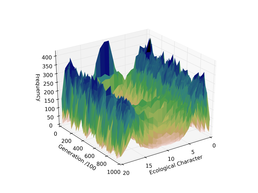Do the adaptive dynamics of host-parasite systems catalyse or constrain sympatric speciation?
- Started
- 3rd October 2012
- Ended
- 14th May 2013
- Research Team
- Daniel Power
- Investigators
- Richard Watson
Theories of how sympatric speciation might occur are experiencing a resurgence, brought about by new models that can explain how ecological specialisation and reduced gene flow might develop concurrently, as well as increasing empirical evidence. Very few of these models consider how the coevolutionary dynamics of host populations with their parasites might affect these outcomes. Yet if sexual lifestyles have evolved or persisted as a means of combating parasites then different mating patterns may be selected to improve this resistance. This study explores how parasite mediated selection for assortative or disassortative mating systems can affect the evolutionary trajectory of host populations in heterogeneous environments. A novel form of the inverse matching alleles (IMA) model is incorporated into a version of Levene’s ’soft selection’ model that incorporates sexual selection mechanisms. Simulation of this model shows how both assortative and dissasortaive mating systems can evolve in response to parasite pressure. The mating system that develops then shapes the evolutionary outcome for the host species, either facilitating or constraining divergence.
Categories
Life sciences simulation: Ecology, Evolution
Algorithms and computational methods: Evolutionary Algorithms
Transdisciplinary tags: Complex Systems
